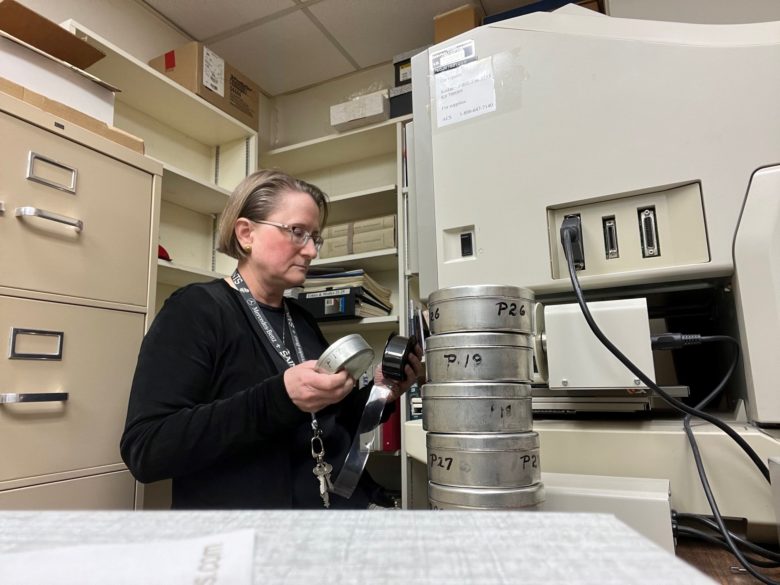From the Archives
By Mary Woodward
JACKSON – Over the past several years programs such as Finding Your Roots have increased an awareness of the existence of records in Catholic archives that could help further family tree research by genealogists and others interested in discovering ancestors.
Ancestry.com DNA tests can reveal ethnic origins and miniscule percentages of faraway lands where one’s 15th great-grandfather would have roamed in the 1500s. I have two friends who did a 23andMe test and found out they were Neanderthals.
Our diocesan archives exist to maintain official diocesan records and documentation of official acts of the bishop. The Code of Canon Law states:
Can. 486 §1. All documents which regard the diocese or parishes must be protected with the greatest care.

§2. In every curia there is to be erected in a safe place a diocesan archive, or record storage area, in which instruments and written documents which pertain to the spiritual and temporal affairs of the diocese are to be safeguarded after being properly filed and diligently secured.
§3. An inventory, or catalog, of the documents which are contained in the archive is to be kept with a brief synopsis of each written document.
In our archives’ office we often get genealogy requests for baptismal records of parents, grandparents, and great-grandparents. Our archive collections contain microfilmed and digitized copies of parish sacramental registers. These copies exist to safeguard the official book registers kept in parishes.
In the past, hurricanes, fires and theft have damaged parish registers. Our copies are available when needed for those particular parishes that have lost registers. Every 10 years we make copies of all parish sacramental registers. The next scheduled round of copying is set for 2026.
Our diocesan policy is these baptismal records are accessible to our approved researcher only. Individuals must submit in writing the records they seek. The archive vault is not open for individuals to come in and look around.
Records must be 100 years or older to be released. Therefore, the only records we can allow to be searched for genealogical purposes as of today are those from 1923 and back.
What I have to explain to inquirers is that the diocesan archives do not exist to fulfill genealogy searches. We will try our best to help but it may take a few months and there is a fee to open the vault for these types of requests.
The latest craze in genealogical research is individuals seeking to establish Dual Italian Citizenship. Apparently, if you meet several criteria you can obtain an Italian passport. According to the Italian Dual Citizenship website Italian/American dual citizenship requirements include five basic guidelines:
- You are descended from someone who was alive in Italy after March 17, 1861.
- The ancestor did not naturalize in another country before June 14, 1912.
- The ancestor did not naturalize before the birth of descendants interested in getting Italian citizenship.
- If the direct-line Italian ancestor is a woman born before January 1, 1948, citizenship can only be claimed from her father’s line.
- No one in the family renounced their Italian citizenship.
You may also qualify if you are a non-Italian who married an Italian citizen.
Because of the large Italian immigrant population along the river in our diocese, we have gotten several requests for sacramental records to help individuals qualify for this genealogical oddity. These requests require more paperwork than other requests. The local parish has to provide a baptismal or marriage record signed and sealed by the current pastor and witnessed by a public notary. It is then sent to the chancery for the diocesan seal to be attached.
Once again, these records must be older than 100 years for us to process them. Parishes are bound by the same policy of 100 years or older.
For more recent records as in the case of someone needing a baptismal certificate for marriage preparation files, the individual of record must request the certificate and present proof of identification if he or she is not known in the parish with the register.
Many times we have received a call from someone’s mother requesting the record so her child can get married and we have to tell the well-intentioned mom that her son or daughter will have to contact us directly. That does not go over too well sometimes, but in this day of identity theft, we cannot release private information to anyone other than the named person or his or her legal guardian in the case of a minor.
Therefore, if you are thinking about researching your family tree and want to use sacramental records, please note the policies above and be patient with us. We are a very small staff and although we enjoy talking with you, our main responsibilities do not include genealogy.
(Mary Woodward is Chancellor and Archivist for the Diocese of Jackson.)
